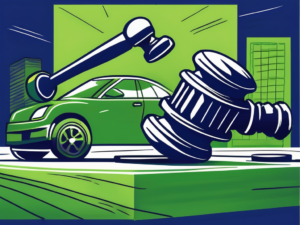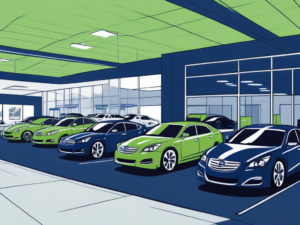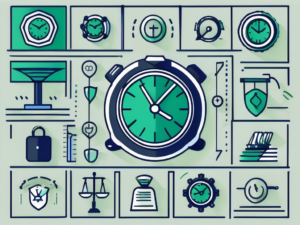Talk to Sales: (401) 200-6026

In the competitive world of car sales, having winning strategies is essential to closing deals successfully. Understanding the basics of car sales, effective communication, the art of negotiation, and after-sale strategies are all crucial components. By mastering these tactics, car sales professionals can increase their chances of success and create lasting relationships with customers. In this article, we will delve into the secrets behind these winning car sales strategies and provide valuable insights for those looking to excel in this field.
Understanding the Basics of Car Sales
Selling cars goes beyond simply presenting the features of a vehicle to potential buyers. One of the key elements of successful car sales is having comprehensive product knowledge. When a salesperson understands every aspect of the cars they sell, they can confidently address customer inquiries and provide accurate information. This level of expertise builds trust and credibility, making customers more likely to make a purchase.
Having comprehensive product knowledge means knowing more than just the basic specifications of a car. A successful car salesperson takes the time to learn about the different trim levels, optional features, and available packages for each model. They can confidently explain the benefits of each feature and help customers understand how it enhances their driving experience. Whether it’s the advanced safety features, the latest entertainment technology, or the fuel-efficient engine, a knowledgeable salesperson can highlight the unique selling points of each vehicle.
Additionally, understanding the financing options available to customers is crucial in the car sales process. A skilled salesperson can explain the different financing terms, interest rates, and payment plans in a clear and concise manner. They can guide customers through the application process and help them choose the financing option that best suits their needs and budget. By providing this level of assistance, salespeople can alleviate any concerns or confusion customers may have about the financial aspect of purchasing a car.
Another essential aspect of selling cars is building trust with customers. Car buyers want to feel confident in their decision and trust the person assisting them. Building rapport and establishing a connection with customers is crucial. By actively listening to their needs and concerns, salespeople can tailor their approach and provide personalized recommendations. This not only builds trust but also demonstrates genuine care for the customer’s satisfaction.
Establishing trust involves more than just being knowledgeable and attentive. It also requires transparency and honesty. A successful car salesperson is upfront about any potential limitations or drawbacks of a vehicle. They provide customers with all the necessary information to make an informed decision, even if it means recommending a different model that better suits their needs. This level of transparency builds trust and ensures that customers feel confident in their purchase.
In addition to product knowledge and trust-building, effective communication skills are essential for successful car sales. Salespeople must be able to articulate the features and benefits of a vehicle in a clear and engaging manner. They should be able to adapt their communication style to suit each customer’s preferences, whether it’s providing a detailed technical explanation or focusing on the overall driving experience. By effectively communicating the value of a car, salespeople can capture the interest and enthusiasm of potential buyers.
Furthermore, a successful car salesperson understands the importance of staying up-to-date with the latest industry trends and developments. They regularly attend training sessions and workshops to enhance their knowledge and skills. By staying informed about new car models, technological advancements, and market trends, salespeople can confidently discuss the latest innovations with customers. This not only showcases their expertise but also helps customers make informed decisions based on the most current information available.
In conclusion, successful car sales involve more than just presenting the features of a vehicle. It requires comprehensive product knowledge, trust-building with customers, effective communication skills, and staying up-to-date with industry trends. By mastering these basics, car salespeople can provide an exceptional buying experience for customers and increase their chances of closing a sale.
Sell cars on the lot faster with AutoRaptor
Know if we’re the right fit within 10 minutes
Effective Communication in Car Sales
Communication skills play a critical role in the success of car sales professionals. Active listening techniques are invaluable when engaging with potential buyers. By actively listening and asking relevant questions, salespeople can better understand the customer’s preferences and needs. This understanding allows salespeople to present suitable options and provide a more personalized experience for the buyer.
When it comes to effective communication in car sales, it’s not just about listening. Sales professionals must also possess persuasive speaking skills. Being able to communicate the benefits and value of a particular vehicle to potential buyers convincingly is key. By articulating the features and advantages clearly, salespeople can address any doubts or objections customers may have, ultimately increasing the likelihood of a sale.
However, effective communication in car sales goes beyond just active listening and persuasive speaking. Building rapport with customers is another crucial aspect. Establishing a connection and fostering a positive relationship with potential buyers can significantly impact the sales process. Salespeople who can create a comfortable and trusting environment are more likely to earn the customer’s confidence and make them feel valued.
Moreover, non-verbal communication plays a vital role in car sales. Sales professionals must be aware of their body language, facial expressions, and tone of voice. These non-verbal cues can convey trust, confidence, and professionalism. Maintaining eye contact, using open and welcoming gestures, and speaking with a clear and enthusiastic tone can enhance the overall communication experience and build credibility with customers.
In the fast-paced world of car sales, effective communication also extends to written communication. Sales professionals often need to send emails, write product descriptions, and create marketing materials. Having strong written communication skills allows them to convey information clearly and professionally, leaving a positive impression on potential buyers.
Furthermore, effective communication in car sales involves adapting to different communication styles. Each customer may have a unique way of processing information and expressing their needs. Salespeople who can recognize and adjust their communication style accordingly can establish better connections with customers and tailor their approach to meet individual preferences.
Lastly, active and ongoing communication is crucial throughout the entire sales process. Following up with customers, providing regular updates, and addressing any concerns or questions promptly can demonstrate a high level of customer service. Sales professionals who prioritize clear and consistent communication build trust and loyalty with customers, increasing the likelihood of repeat business and referrals.
The Art of Negotiation in Car Sales
Negotiation is an art form that can greatly impact the outcome of a car sale. Successful negotiations require understanding the buyer’s perspective. By putting themselves in the buyer’s shoes, salespeople can empathize and tailor their approach accordingly. This understanding helps to bridge the gap between the buyer’s expectations and the seller’s objectives.
When it comes to negotiating in car sales, there are several key factors to consider. Firstly, it’s important for salespeople to thoroughly research the market value of the car being sold. This knowledge allows them to set a realistic price and negotiate with confidence. Additionally, understanding the buyer’s needs and preferences can give salespeople an edge during negotiations. For example, if the buyer is looking for a fuel-efficient car, highlighting the car’s low fuel consumption and eco-friendly features can help sway their decision.
Developing effective negotiation strategies is crucial to secure a favorable outcome for both parties. By employing techniques such as creating win-win scenarios and offering alternatives, salespeople can ensure that both the buyer and seller feel satisfied with the agreement. Finding common ground and focusing on mutual benefits allows salespeople to navigate negotiations successfully and close deals more efficiently.
During negotiations, it’s essential for salespeople to maintain a positive and professional demeanor. This includes active listening, showing respect, and avoiding confrontational tactics. By fostering a collaborative atmosphere, salespeople can build trust with the buyer and increase the likelihood of reaching a mutually beneficial agreement.
Another important aspect of negotiation in car sales is the ability to effectively communicate the value of the car. Salespeople should highlight the car’s unique features, performance capabilities, and any additional perks or warranties included in the sale. By emphasizing the value proposition, salespeople can justify the price and negotiate from a position of strength.
Furthermore, being knowledgeable about the car’s history and condition can also play a significant role in negotiations. Providing accurate and detailed information about the car’s maintenance records, accident history (if any), and overall condition can instill confidence in the buyer and potentially lead to a smoother negotiation process.
In conclusion, negotiation is a vital skill in the world of car sales. By understanding the buyer’s perspective, developing effective strategies, and maintaining a professional demeanor, salespeople can successfully navigate negotiations and close deals that leave both parties satisfied. The art of negotiation in car sales is not just about getting the best price; it’s about building relationships, understanding customer needs, and creating win-win situations.
Sell cars on the lot faster with AutoRaptor
Know if we’re the right fit within 10 minutes
Closing the Deal: Techniques and Strategies
Identifying buying signals is a pivotal skill in closing car sales deals. Sales professionals must be able to recognize the cues that indicate a potential buyer is ready to make a purchase. These signals may include asking specific questions about price, financing options, or warranties. Once identified, salespeople can confidently guide buyers towards the final steps of the sales process.
Overcoming objections is another essential aspect of closing deals. Potential buyers may have concerns or reservations that need to be addressed before committing to a purchase. Sales professionals should anticipate common objections and have well-prepared responses. By addressing these objections honestly and with confidence, salespeople can alleviate any doubts and move the buyer closer to closing the deal.
The power of the test drive should not be underestimated. Allowing potential buyers to experience the car firsthand can have a significant impact on their decision-making process. Sales professionals should encourage test drives and ensure that customers have the opportunity to explore the features and performance of the vehicle. This hands-on experience often solidifies the buyer’s interest and increases the likelihood of a successful sale.
After-Sale Strategies to Ensure Repeat Business
The journey doesn’t end once a car sale is completed. To ensure repeat business and maintain customer loyalty, car sales professionals must implement effective after-sale strategies. Following up with customers after the purchase shows care and dedication to their satisfaction. Salespeople should reach out to customers to ensure they’re satisfied with their purchase and address any concerns that may arise.
Creating a referral program can also be a powerful after-sale strategy. Satisfied customers are often willing to refer friends and family to the dealership or salesperson. Implementing a program that rewards customers for referrals can incentivize them to recommend the dealership to others, increasing the potential for future sales.
In conclusion, winning car sales strategies revolve around understanding the basics of car sales, effective communication, the art of negotiation, and implementing after-sale strategies. By mastering these secrets to closing deals, car sales professionals can become successful in their field and forge lasting relationships with customers. Implementing these strategies requires a combination of product knowledge, communication skills, empathy, and proactive follow-up. With dedication and practice, anyone can become a master car salesperson.
Want to improve your sales and move cars off the lot faster? Book a test drive with AutoRaptor to see how our simple dealership CRM software can help you close more deals effectively.
Subscribe to our Newsletter
Resources to help your dealership convert more leads into sales, retain more customers, and market inventory smarter, straight to your inbox every Sunday.




